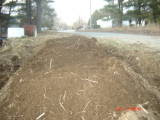Agribusiness Dealt a Blow by Local Agriculture in England
"If it bleeds, we can kill it." Arnold Schwarzenegger in "Predator."
McDonalds in Devon, England driven out of business by Local Agriculture.
http://news.bbc.co.uk/2/low/uk_news/england/devon/6214686.stm
John Taylor, Tavistock Forward and EatWise chairman, said: "It just goes to show that the food is so good here we have seen them off.
"Because of the quality of our local food, McDonald's has not been able to compete. I think there is definitely a link.
"We have made every effort to make Tavistock a haven for local food and McDonald's wasn't local food, so they suffered."
-snip
"Since the restaurant opened in 1999, the trading patterns of Tavistock high street have changed and as a result we have taken the difficult decision to cease trading at this site."
-snip
Can the Agribusiness Beast be taken down? Or, even more important, can it be taken down without us going down with it?
The shutdown of a McDonalds in Devon England is big news for Local Agriculture activists who are just beginning to come in from the cold of citizen apathy. Movies like "Fast Food Nation," and other cinematic depictions of grotesqueries in fast food restaurants are beginning to jar the public consciousness. Outbreaks of food borne illnesses are helping as well, as reported recently at Salon magazine:
http://www.salon.com/news/feature/2006/12/07/pollan_bad_food/
What's wrong with our food?
E. coli at Taco Bell, Listeria in our Thanksgiving turkey, a report of unprecedented contamination in our chicken. Michael Pollan, author of "The Omnivore's Dilemma," explains why.
-snip
More bad news, in fact, nightmarish news -- transgenic biofuel crops.
Whenever you hear "biofuel," or "biodiesel," I want you to think, "mass starvation." There are 7 billion people in the world, and they are only fed because of Industrial Farming. Industrial Farming requires 10 calories of oil for every calorie of food, not including transportation or energy to run the store, or energy to bring workers and consumers to supermarkets.
Biofuel will mean that croplands to feed humans or livestock animals will be competing with croplands for fuel for military machines and transport fuels. As George Monbiot puts it, this will be "feeding cars not people."
http://www.monbiot.com/archives/2004/11/23/feeding-cars-not-people/
http://www.monbiot.com/archives/2005/12/06/worse-than-fossil-fuel/
Transgenic biofuel crops raise the stakes even higher. Frankencrops for fuel could spread over food cropland and "choke out" food plants, or deplete native soils, or pollute the gene pool of natural crops:
http://www.salon.com/tech/htww/2006/12/08/transgenic_switchgrass/index.html
But the stakes are raised incomprehensibly high when we start talking about energy crops. There will be tremendous pressure both to perfect gene confinement technologies andto get to market with transgenic super-crops.
For ecologists, David Tilman's vision of a reinvigorated prairie, chockfull of multiple strains of naturally occurring grasses harvested sustainably for their biomass, is alluring. But far more likely is the industrial-strength monoculture engineered with one aim in mind -- feeding the world's energy maw. And unless we're very, very careful, the transgenes will go wild, until there is no wild left.
--snip
IT'S NOT JUST ABOUT PROFITS. IT'S ABOUT CONTROL OF THE FOOD SUPPLY
That's right, folks. If it was just about profits, then Agribusiness wouldn't receive an absurd amount of government subsidies every year. Even the ultra-conservative Heritage Foundation has complained about farm subsidies:
http://www.heritage.org/Research/Budget/bg1763.cfm
Why so much subsidies? To drive small farmers out of business. First they did it here in the United States, then they started exporting corn for less than the cost of producing it to Mexico, apparently with the explicit goal of ruining millions of Mexican peasant corn farmers! That's why so many of them are coming here!
It's instructive that Americans did not band together back in the 1970's and 1980's to save family farms. It seems like both farmers and consumers didn't think to do this. Farmers were too proud to ask ordinary people to buy directly from them, and instead thought of themselves in an "industrial farming model" who succeeded or failed based on their individual virtues (in a rigged game I might add) rather than a "community farming model," where farmers were recognized as a local public good, and voluntarily supported and protected by local citizens.
Many people in Connecticut and New Jersey bemoan the development of what seems like every bit of wild land left for shopping malls and subdivisions. Our landscape has been plundered.
This would never have happened had we supported local farmers in the first place. Those farmlands would have never been sold off to greedy developers. We wouldn't be so dependent on the defense industry and casinos for so-called "jobs." We could have stopped cancerous economic growth in its tracks. But WE, collectively, chose not to do so.
Now it's time to try and save what we can. Many people in Connecticut have lawns. Those lawns need to be converted to food gardens. We must shake our little fists at the Agribusiness Beast, which is poised to devour and destroy us all.
Saturday, December 09, 2006
Subscribe to:
Post Comments (Atom)

1 comment:
You can't beat a proper ground beef burger - but made from proper Devon beef, bought locally.
Post a Comment